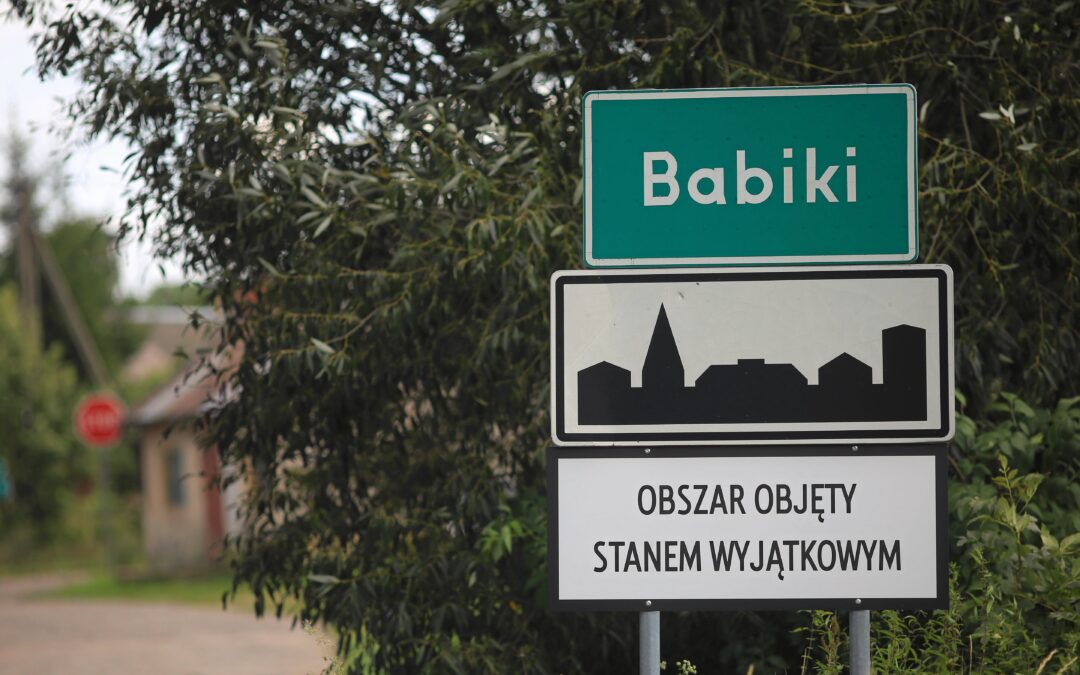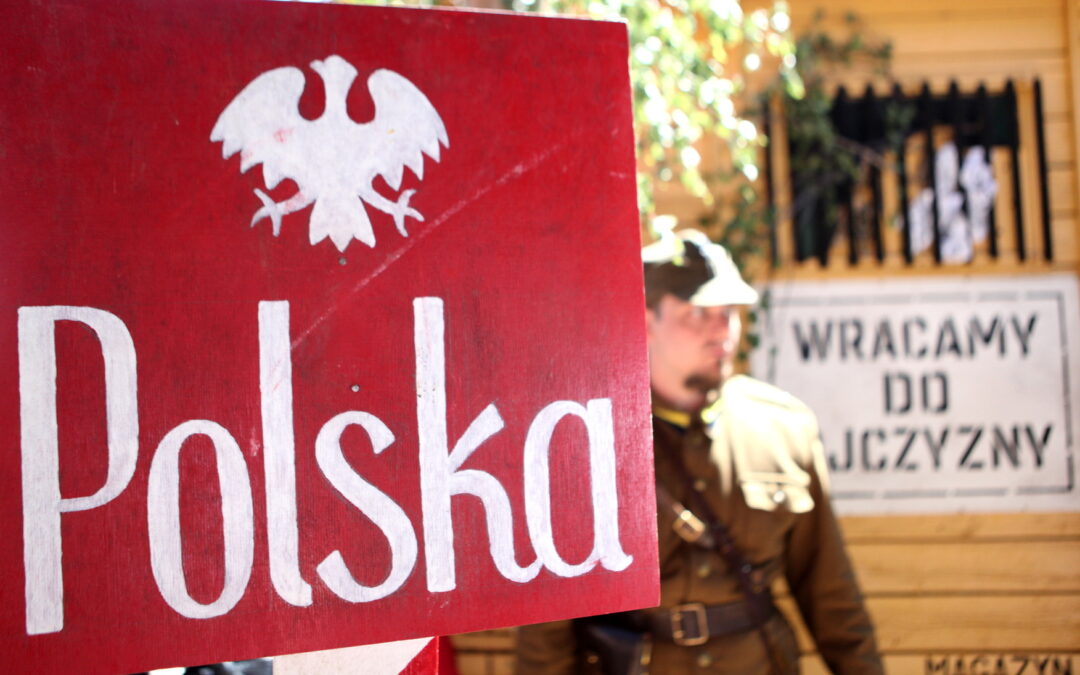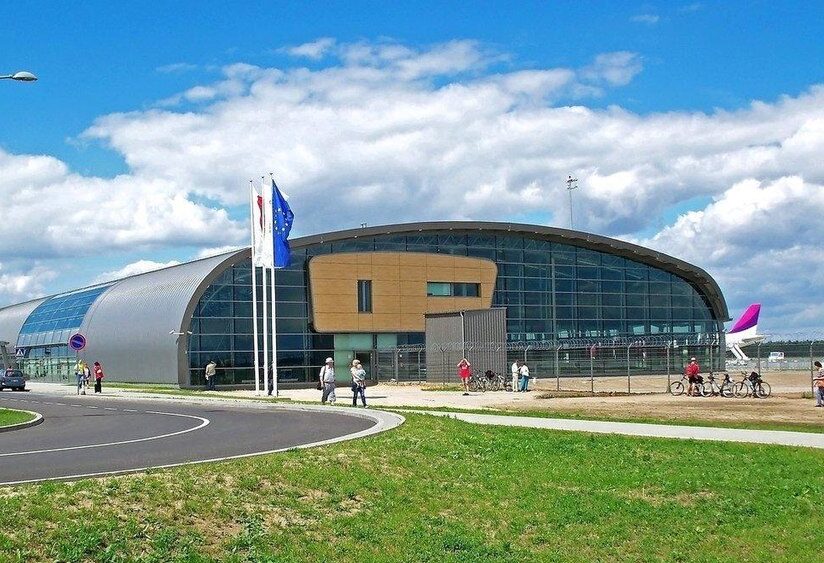Two journalists have been charged by police for reporting from an area on Poland’s border with Belarus that has been placed under a state of emergency due to a surge in illegal crossings. Groups including Amnesty International and Reporters Without Borders have expressed concern.
On Friday, Bartłomiej Bublewicz and an unnamed cameraman recorded a report for news website Onet on how the state of emergency – which was introduced at 10 p.m. on Thursday – was being implemented. The footage was recorded near a spot where around 30 Afghan asylum seekers have been camped for weeks.
Under the new regulations, the authorities have barred non-resident civilians from entering the area and restricted public information about what is happening there. The government argues that the measures are necessary to tackle the crisis. But critics say they are trying to prevent people from knowing what is going on.
For more on the state of emergency the president and government have declared on border with Belarus, see our recent report.
The lower house of parliament – where the government recently lost its majority – can overturn the state of emergency in a vote https://t.co/RvfiacuWG4
— Notes from Poland 🇵🇱 (@notesfrompoland) September 2, 2021
After Bublewicz’s report was broadcast by Onet – which is Poland’s biggest online news portal – the journalist and his cameraman said they were summoned to a local police station, where their memory cards were taken and they were charged with “being in a prohibited area” and “recording border infrastructure with technical equipment”.
A police spokesman confirmed to the Polish Press Agency (PAP) that the men had been charged, but said that some aspects of the “not entirely reliable” account they had given via Onet were untrue.
Onet condemned the police’s actions, which its deputy editor, Paweł Ławiński, said “confirm that the main aim of the authorities is to prevent the media from reporting the situation at the border…The government wants to hide something”.
Sytuacja na granicy polsko-białoruskiej. "Nie ma żadnych dziennikarzy oprócz nas". Relacja reportera Onetu https://t.co/E68j5wXKhe pic.twitter.com/J9JEKQb958
— Onet Wiadomości (@OnetWiadomosci) September 3, 2021
A lawyer for Ringier Axel Springer Polska, the Swiss- and German-owned firm that publishes Onet, said that the “charges in this case are intended to intimidate and obstruct the work of journalists”. He argued that the reporters had not filmed any border infrastructure.
Marcin Matczak, a legal scholar, told Onet that the police’s actions against the journalists were “a restriction of the right to information and a violation of fundamental freedoms”. He noted that actions taken under a state of emergency have to be commensurate to the threat posed.
Press Club Polska, part of the International Association of Press Clubs, appealed to the government to add journalists to the list of those exempted from entering the emergency zone. Amnesty echoed that call, saying that “the loss of the right of people to be informed about what is happening there increases the risk of human rights violations”.
Amnesty also expressed concern over the “the proportionality of the restrictions” put in place by the Polish authorities. “The mere ‘legality’ of the government’s actions is not sufficient in the light of international standards,” the NGO’s Agnieszka Dąbrowiecka told Onet.
Reporters Without Borders (RSF), a Paris-based NGO that defends independent journalism and access to information, declared that it was “alarmed by the charges brought against Bublewicz and his cameraman”. It called on the Polish authorities to take account of the role journalists play in monitoring the government.
RSF has regularly warned about what it and other NGOs see as the decline of media freedom in Poland. Since 2015, when the current government came to power, Poland has fallen from its highest ever position of 18th in RSF’s World Press Freedom Index to its lowest ever ranking of 64th.
.@RSF_inter calls on law-enforcement authorities dealing with the case to duly consider the journalists' role in controlling the government. The @onetpl case is 1 more reason for Parliament to examine necessity of the #PressFreedom restrictions as it votes on state of emergency.
— RSF in English (@RSF_en) September 4, 2021
Figures associated with Poland’s national-conservative ruling camp, however, criticised the actions of the Onet journalists. They were “rightly” charged, tweeted Law and Justice (PiS) MP Jan Mosiński. “The law must be obeyed.”
Journalists from public media, which are a mouthpiece for the government, also expressed little sympathy. “Didn’t you know it would end like this?” wrote Samuel Pereira, head of state TV’s news website.
“Journalists should not break the law,” Andrzej Potocki of PiS-linked newspaper Sieci told public broadcaster Polskie Radio. “If journalists want to take risks, go ahead, but don’t be surprised at the consequences.”
Signs have gone up declaring Poland's first state of emergency since the communist period, which has been implemented along the border with Belarus due to a surge in illegal crossings https://t.co/LtgKlOvcH0
— Daniel Tilles (@danieltilles1) September 2, 2021
Main image credit: Agnieszka Sadowska / Agencja Gazeta

Daniel Tilles is editor-in-chief of Notes from Poland. He has written on Polish affairs for a wide range of publications, including Foreign Policy, POLITICO Europe, EUobserver and Dziennik Gazeta Prawna.




















